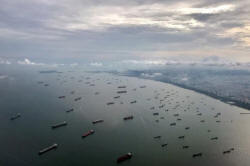|
European banks struggle to
solve toxic shipping debt problem
 Send a link to a friend
Send a link to a friend
 [July 24, 2017] [July 24, 2017]
By Jonathan Saul
LONDON (Reuters) - Dutch shipowner Vroon is finding talks with banks
tough going as it tries to navigate a way out of a long slump in the
shipping industry. But it is not an easy time for the lenders either.
Vroon, a 127-year-old family-owned group which operates about 200
vessels and transports livestock, oil and other commodities, wants to
extend its credit lines and adjust repayment schedules.
But European banks that lent heavily to the sector when it boomed more
than a decade ago have a heavy toxic debt burden following the 2008-09
global financial crisis and a shipping markets crash in 2010.
Shipping firms and banks are caught in a vicious circle of debt, causing
a credit crunch that is hindering the industry's recovery. Overcapacity
-- a glut of available ships for hire -- is a big concern, and another
is a lack of profitability caused by problems such as slower demand and
global economic turmoil.
One of the major companies, South Korean container line Hanjin Shipping
Co Ltd, has gone under.

"We have difficulty in meeting all repayment obligations that we have
and that is what we are in discussion with our banks about. Those
discussions are constructive but are not easy -- not for us, or the
banks," Herman Marks, the chief financial officer at Vroon, told
Reuters.
"It is the lack of profitability for the industry that is causing the
lack of availability of finance."
Marks said Vroon was confident of reaching agreements with its
financiers soon.
Shipping finance sources say the shipping industry, which transports 90
percent of the world's goods including oil, food and industrial products
such as coal and iron ore, has an estimated capital shortfall of $30
billion this year.
Some banks are being driven out of shipping and those that remain are
now more conservative in their financing, Marks said.
"It is an industry that requires consolidation," he added.
That consolidation has begun, especially in container shipping.
Denmark's Maersk Line, the global leader in the sector, is acquiring
German rival Hamburg Sud and China's COSCO Shipping Holdings Co Ltd has
bid $6.3 billion for Hong Kong peer Orient Overseas International Ltd.
Germany's Rickmers filed for insolvency in June, and firms that have
filed for Chapter 11 bankruptcy protection since March include
Singapore's Ezra Holdings Ltd and U.S.-based firms Tidewater, GulfMark
Offshore and Montco Offshore.
For a graphic on global shipping, click http://tmsnrt.rs/2t5bNzr
DOWNTURN
Banks were happy to lend to the shipping industry when it boomed after
the surge in trade that accompanied globalization.
Even the 2008-09 crisis did not deter all creditors. Expectations that
China's fast economic growth would revive the industry prompted a brief
new wave of lending before many shipping markets crashed again.

This left European banks with a debt burden of more than $100 billion
and the value of at least 70 percent of those loans has fallen,
according to industry estimates. Banks are struggling to find ways to
recoup their mounting losses.
"There is probably about $150 billion of distressed bank debt stuck with
mainly European banks -- mainly German -- that has still got to be
de-gorged from the system," said Michael Parker, global industry head
for shipping with Citigroup.
Large banks that once had a big role in the industry, such as Britain's
Royal Bank of Scotland (RBS), are pulling out. Some more specialist
lenders, such as Germany's HSH Nordbank, are still working through their
legacy loans.
Ratings agency Moody's said in June it expected further losses as
problem shipping loans continue to mount, possibly affecting banks'
profitability and capital in 2017 and potentially beyond.
The European Central Bank said in May it would be carrying out on-site
inspections at banks with a view to possible "remedial actions".
Regulators want banks to shore up their balance sheets and comply with
stress tests, which assess whether a bank has enough capital to cope
with adverse developments.
"The belief that the regulators will allow the banks to go back to
creating the disaster they created five, 10 years ago -- I think is
highly unlikely," Citi's Parker told a Capital Link shipping conference
in March.
[to top of second column] |

A bird's-eye view of ships along the coast in Singapore July 9,
2017. REUTERS/Jorge Silva

German state-controlled lenders known as landesbanken, including HSH and NordLB,
are among the hardest hit.
HSH was forced to take a second bailout from its public-sector owners because of
provisions for bad shipping loans, and has to be privatized under European
state-aid rules by the end of February 2018.
HSH had reduced its total shipping portfolio to 16.6 billion euros ($19.36
billion) by the end of the first quarter of 2017, from more than 30 billion
euros nearly a decade ago.
By the end of the first quarter of 2017, HSH had 9.9 billion euros in its
so-called ‘bad bank’ that it is running down, and the remaining 6.7 billion
euros in its core bank.
"We have learned a lot of lessons from the past. We are conservative, we are
cautious," Christian Nieswandt, global head of shipping at HSH, told Reuters. "I
do not think people would do the same things now that they did in the past."
LOSSES PILED UP
NordLB set aside 2.94 billion euros in 2016 in provisions for bad shipping
loans.
NordLB is preparing a sale of its property lender Deutsche Hypothekenbank as it
seeks to repair its balance sheet following heavy writedowns related to its
exposure to bad shipping loans, people close to the matter told Reuters.
Banks in Germany were exposed when a number of closed shipping investment funds
known as KG houses were forced into insolvency, leaving the banks carrying the
risks.
The banks were also exposed when the container shipping sector, which
traditionally accounted for a large segment of Germany's shipping industry, ran
into trouble.

Dagfinn Lunde, former head of shipping at Germany's DVB Bank, said a further
problem arose because loans had been used to finance a type of container ship
which became obsolete once the Panama Canal was extended in 2016.
"The losses were clocking up without them (the banks) seeing it," Lunde said.
With the shipping industry still struggling, the banks' prospects for offloading
their toxic debts are challenging.
"How are they going to recoup an asset that is losing money all the time?" said
Mark Clintworth, head of shipping at the European Investment Bank. "They will
have to ring-fence their shipping assets and in a worst-case scenario take a
complete haircut on it."
FIRE SALES
European banks have stepped up efforts to get rid of shipping loans by selling
portfolios. RBS has sold hundreds of millions of dollars in loans to buyers
including Japanese financial services firm Orix Corp.
Others have found selling more difficult. Attempts by HSH to sell a
500-million-euro segment of shipping loans, as part of a 3.2-billion euro
portfolio sale which included other assets, proved unsuccessful because the debt
was deemed toxic and attracted offers that the bank considered too low, shipping
finance sources said. HSH declined to comment.
NordLB said in July it had abandoned efforts to sell a 1.3-billion euro
portfolio of loans to U.S. private equity group KKR.
Germany's Commerzbank said in June it had sought to shed its 4.5-billion euro
portfolio of distressed shipping loans through swaps with covered bonds --
securities backed by shipping mortgages. It is not yet known whether it will
succeed.
Sellers still trying to offload billions of dollars in loans include Deutsche
Bank, shipping finance sources say.
"Investors will want to see a bit more sustained profitability to the sector -
there is some way to go before that," said Paul Taylor, global head of shipping
& offshore with French bank Societe Generale CIB.
(Editing by Timothy Heritage)
[© 2017 Thomson Reuters. All rights
reserved.] Copyright 2017 Reuters. All rights reserved. This material may not be published,
broadcast, rewritten or redistributed.
 |